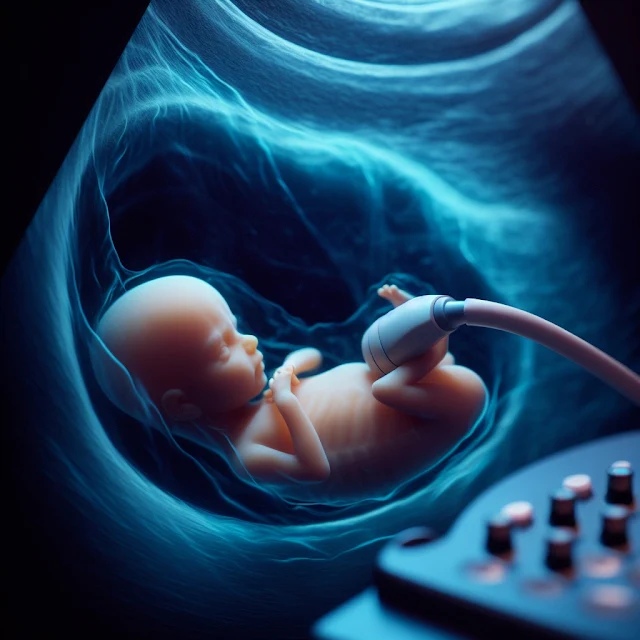Baby's Womb Whispers: Decoding Potential Signs of Autism While Pregnancy
Ever wondered if your little bean might be neurodivergent?
You're probably picturing ultrasounds, scans, and doctors in lab coats, right? Well, what if I told you there might be clues hiding in plain sight, right now, in your own growing belly?
It's true! While diagnosing autism during pregnancy is still like finding a four-leaf clover in a snowstorm, scientists are uncovering whispers of the womb, little signs that might give us a peek at our baby's unique brain wiring.
Imagine feeling those tiny kicks and flutters, each one a message from your growing miracle. But what if some babies tap out different rhythms? What if loud noises in the outside world make them flinch more than others? Could these be tiny clues to how their brains are processing the world?
Hold on, mama, don't start planning therapy sessions just yet! These are just whispers, not pronouncements. We're not talking crystal balls here. But what if they could be whispers worth listening to? What if, by paying attention and talking to your doctor, you could be laying the groundwork for even more amazing things for your little one, regardless of whether they're neurotypical or not?
Yeah, I'm talking early intervention, mama. Not a label, not a prediction, but a gentle nudge in the right direction, a head start on unlocking all the potential swirling inside your tiny astronaut.
So, buckle up, because we're about to dive into the fascinating world of prenatal whispers, decoding potential signs of autism while you're still pregnant. We'll talk about brain development, movement patterns, sensory sensitivity, and even those mysterious ultrasound findings. But most importantly, we'll talk about you, mama, and how becoming a detective of your own baby's development can be the most empowering journey of all.
Ready to listen to the whispers of your womb? Let's get started!
What is autism?
Autism, or Autism Spectrum Disorder (ASD), is a developmental condition that affects how people communicate and interact with the world around them. It's a spectrum, which means that it can manifest in different ways and with varying degrees of intensity. Some autistic individuals may have difficulty with social interaction and prefer solitude, while others may be highly social but struggle with understanding nonverbal cues or expressing themselves clearly.
One of the hallmarks of autism is a difference in how people process sensory information. Some autistic individuals may be hypersensitive to sounds, lights, or textures, while others may be hyposensitive and barely register these stimuli. This can lead to challenges in everyday situations, like being overwhelmed in crowded environments or having difficulty filtering out background noise.
It's important to remember that autism is not a disease or something to be "cured." It's a different way of experiencing and interacting with the world, and autistic individuals have many strengths and talents to offer. With the right support and understanding, they can thrive and lead fulfilling lives.
Whispers in the Womb: Potential Signs of Autism During Pregnancy
Remember that sweet flutter you felt, the first tiny kicks that announced your little bean's presence? Well, those movements, along with other subtle cues, might hold whispers of how your baby's brain is developing.
Now, before you start Googling "autism prenatal ultrasound signs," let's take a deep breath and remember these are just whispers, not pronouncements. We're not talking mind-reading here, but rather intriguing clues that might warrant a chat with your doctor.
Mini Movers: A Different Rhythm
Imagine your baby's movements as a dance. Some babies might be pirouetting princesses, while others are more like headbanging rockstars.
Studies suggest that fetuses with autism might have distinct movement patterns, like a preference for repetitive kicks or less responsiveness to touch. It's like they're grooving to their own internal beat.
Sensory Symphony: A Different Tune
Some babies seem to relish the world's cacophony, while others are like tiny audiophiles, easily overwhelmed by loud noises. Research hints that fetuses with autism may exhibit different responses to sound and light, perhaps flinching at a sudden beep or finding solace in a specific lullaby. It's like they're tuning into a different frequency.
Brain Builders: A Different Blueprint
Scientists are peeking into the fascinating world of fetal brain development, discovering that some differences might be present early on.
Studies show that certain brain regions, like the insula and amygdala, which are involved in processing emotions and sensory information, might be larger in fetuses later diagnosed with autism. It's like they're building their own unique neurological masterpiece.
Ultrasound Clues: A Different Picture
Recent research has unveiled intriguing findings: fetuses with autism might have specific anomalies visible on routine ultrasounds. We're talking about things like subtle differences in the heart, head, or kidney development. It's like a snapshot that might offer a glimpse into their unique neurodevelopment.
Now, remember, these whispers are not guarantees. Not every baby who moves differently or flinches at a loud noise will have autism. And even if they do, it's just one piece of the puzzle. The true magic lies in staying informed, talking openly with your doctor, and embracing your baby's unique journey, no matter where it leads.
So, listen to the whispers, mama. They might hold the key to unlocking your child's incredible potential, empowering you to be their biggest advocate and cheerleader from day one.
Cautious Optimism and Next Steps: Navigating the Nuances
As we delve into the world of prenatal whispers, it's crucial to approach these findings with cautious optimism. Unlike a definitive diagnosis, these cues serve as gentle nudges to open communication with your healthcare provider, allowing for a comprehensive assessment and early intervention if warranted.
Remember, every baby is unique, and these subtle differences may not always indicate autism. However, by being attentive to these early signs and seeking expert guidance, we can embark on a journey of informed observation, open communication, and early intervention, ensuring that every child, regardless of their neurodiversity, receives the love, support, and opportunities to thrive.
So, mama, don't let these whispers overwhelm you with worry. Instead, let them empower you to become a detective of your baby's development. Talk to your doctor, seek out reliable resources, and join online communities where you can connect with other expectant parents navigating similar journeys.
Remember, early intervention is not about labeling or predicting a child's future but rather about providing the necessary support to nurture their unique strengths and address any developmental challenges. By arming yourself with knowledge and partnering with your child's healthcare team, you can create a world where your child can reach their full potential.
So, embrace the whispers, mama, and embark on this incredible journey of discovery and support. Remember, every child is a masterpiece waiting to be unveiled, and your role is to nurture and celebrate their unique brilliance.
Final Thoughts: Embrace the Whispers, Empower Your Journey
As we close this chapter on prenatal whispers, let's leave behind fear and uncertainty, and instead embrace a call to action:
- Listen to the whispers: Be mindful of your baby's movements, responses to stimuli, and any subtle cues that might feel different. Remember, these are just whispers, not pronouncements, but they can be valuable pieces of the puzzle.
- Talk to your doctor: Share your observations openly and honestly. They are your partner in navigating this journey, and their expertise will be invaluable in interpreting the whispers and guiding you toward the right resources.
- Seek reliable information: Don't get lost in the ocean of online chatter. Stick to reputable sources like medical websites, autism organizations, and research publications. Knowledge is power, mama!
- Connect with other mamas: Find online communities or support groups where you can share experiences, ask questions, and offer encouragement to one another. You're not alone in this!
- Celebrate your baby's uniqueness: Remember, whether your little one is neurotypical or neurodivergent, they are a precious miracle with their own special strengths and talents. Embrace their individuality and shower them with love and support.
- Early intervention: often whispered about in hushed tones, isn't about labeling or fixing your child. It's about providing a gentle nudge in the right direction, a head starts on unlocking all the potential swirling inside your tiny astronaut.
- Think of it this way: imagine your baby as a beautiful, intricate puzzle. Every piece, every unique quirk, contributes to the breathtaking masterpiece they will become. By listening to the whispers, you're gathering those pieces, understanding their shapes and textures, so you can help them assemble their own magnificent picture.
So, mama, let's rewrite the narrative. Let's turn these whispers into a symphony of support, a lullaby of empowerment. Let's embrace the journey of prenatal discovery, not with fear, but with open hearts and curious minds. Because every child, regardless of their neurodiversity, deserves to be celebrated, supported, and empowered to shine their brightest light.
Together, let's turn the whispers of the womb into a roar of love, a testament to the incredible possibilities that await every child, every family, and every unique and precious little soul.
Frequently Asked Questions (FAQs)
Can I really tell if my baby will have autism during pregnancy?
No, there is no single definitive test to diagnose autism prenatally. However, recent research suggests there may be some potential signs to look for, like:
- Fetal movement patterns: Some studies show fetuses with autism may move less often or have different kicking patterns.
- Sensory responses: Research suggests these babies might be more sensitive to loud noises or bright lights in the womb.
- Brain development: Scientists are exploring potential differences in specific brain regions, like the amygdala and insula, which process emotions and sensory information.
- Prenatal ultrasound findings: Recent studies link specific anomalies in heart, head, or kidney development with later autism diagnosis.
- Maternal factors: Conditions like pre-eclampsia, obesity, or diabetes during pregnancy might be linked to increased autism risk.
Should I be worried if I notice these signs?
It's important to remember that these are just early-stage findings, not guarantees. Many babies who exhibit these differences won't have autism, and there are many reasons why a fetus might move or react differently.
Instead of worry, use these signs as a nudge to talk to your doctor. They can help interpret the whispers and provide guidance based on your specific situation.
Does this mean my baby needs early intervention?
Early intervention isn't about labeling or fixing your child. It's about providing tailored support to nurture their unique strengths and address any developmental challenges, regardless of diagnosis.
By being informed and working with your doctor, you can create a supportive environment where your child thrives, whether they're neurotypical or neurodivergent.
Are there reliable resources for pregnant parents concerned about autism?
Absolutely! Here are some trusted sources:
- Autism Speaks: https://www.autismspeaks.org/
- National Autistic Society: https://www.autism.org.uk/
- Centers for Disease Control and Prevention (CDC): https://www.cdc.gov/ncbddd/autism/index.html
- SPARK for Autism Research: https://sparkforautism.org/
These websites offer accurate information, support groups, and expert resources.
Books:
- "The Prenatal Autism Handbook: A Guide for Parents and Professionals" by Emily Stevenson
- "Understanding Your Autistic Child: A Comprehensive Guide for Parents" by Claire Kelly
- "The Baby Decision: How to Make the Most of Your Baby's Brain" by Merle Bombardieri
What's the most important thing to remember?
Above all, trust your instincts and embrace open communication with your doctor. Every baby is unique, and these whispers are just one piece of the puzzle.
Focus on celebrating your child's individuality, showering them with love, and building a supportive environment where they can flourish.
Remember, every child has the potential to shine brightly, regardless of their neurodiversity.


